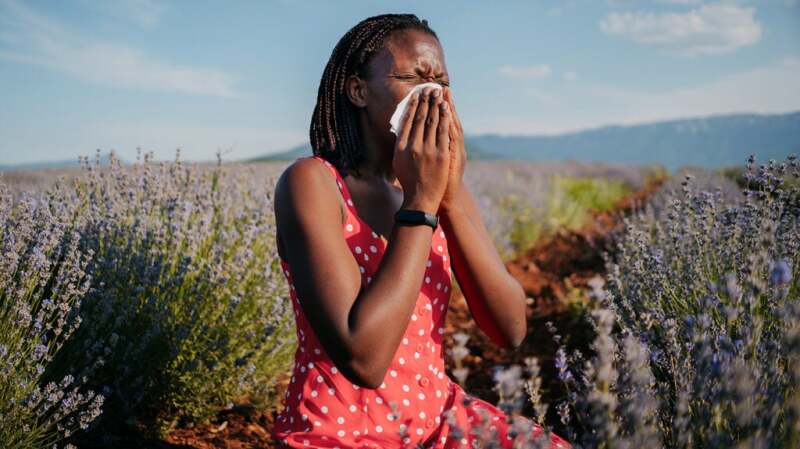This article discusses medical and natural remedies that may help you stop sneezing.

Blowing your nose helps rid the nasal cavity of irritating particles. This can reduce or stop sneezing in some cases. However, blowing your nose may not lead to total elimination of sneezing.
If you have allergies or a cold, residual irritation lingers in the nasal passage. This irritation will cause further sneezing episodes.
Avoiding colds and the flu
When people with viral respiratory infections sneeze, they spread infectious droplets. Research indicates that a single sneeze can create up to 40,000 virus droplets. These droplets spread over an area up to 27 feet. They stay suspended in the air for up to 10 minutes.
The Centers for Disease Control and Prevention (CDC) recommends these steps to prevent the spreading of respiratory infections:
- Cover your mouth and nose with a tissue when you sneeze, and dispose of the tissue immediately.
- If you do not have a tissue, sneeze into your elbow, not your hands.
- Do not share cups or utensils.
- Wash your hands for at least 20 seconds.
- Avoid close contact with others.
- Regularly disinfect surfaces.
You can use over-the-counter (OTC) medications to help alleviate cold or flu symptoms. Most colds resolve within 10 days. If you continue to have symptoms, you may want to contact your doctor for additional treatment. Consider getting an annual flu vaccine to help boost your immune system.
Learn how to prepare for the flu season.
Allergies are an exaggerated immune response to a foreign substance. One of the most common types of allergic rhinitis, or nasal inflammation caused by allergens, is hay fever. In the United States, hay fever affects up to 60 million people yearly. Pollen from trees, grass, weeds, and flowering plants causes hay fever.
Several OTC treatments can help reduce allergy symptoms. Antihistamines, such as cetirizine (Zyrtec), relieve sneezing, itchy eyes, and a runny or stuffy nose.
Nasal corticosteroid sprays, such as fluticasone (Flonase), reduce inflammation and help reduce sneezing and nasal congestion. Start using the nasal spray 2 weeks before the start of seasonal allergies. Use nasal sprays regularly for the best results.
If the above medications are ineffective in reducing your symptoms, your doctor may refer you to an allergy specialist. They can provide allergy testing and immunotherapy treatment.
Immunotherapy exposes you to higher and higher concentrations of an allergen over time. In this way, you become desensitized to it. There are two regimens:
- regular allergy shots every 2–4 weeks, continuing for 3–5 years
- sublingual immunotherapy (SLIT), which introduces allergens in tablet form under the tongue daily
Immunotherapy can provide lasting remission of allergy symptoms.
Read more about seasonal allergies.
Here are some ways to avoid sneezing triggers.
Pet allergies:
- Keep pets well groomed and out of the bedroom.
- Frequently wash any blankets or beds that pets sleep on.
- Consider a dog breed that does not shed or sheds very little.
Hay fever:
- Avoid going outdoors during high pollen counts.
- Keep windows and doors shut.
- Frequently vacuum and dust with a damp mop.
- Frequently wash bed linens in hot water.
- Use high efficiency particulate air (HEPA) filters and vacuums.
- Wear a hat and sunglasses outside to keep pollen out of your eyes and hair.
- Use air conditioning indoors and in your car.
Make sure your doctor is aware of any allergies you have to medications, latex, or other medical supplies.
Nasal irrigation with a saline or saltwater solution may help reduce congestion and remove irritants like pollen. There are OTC saline sprays, or you can use a neti pot. The FDA recommends using only distilled, sterile, or previously boiled water with these devices. This is to avoid potentially serious nasal infections from tap water. Carefully follow the instructions for your neti pot, and always wash and dry it between uses.
Learn how to make a saline rinse.
Adjusting your environment
Keeping your environment free from allergens can help reduce sneezing. Some adjustments you can make include:
- using air purifiers
- using dehumidifiers
- removing mold
- regularly dusting and vacuuming
- improving ventilation
- banning indoor smoking
Some people sneeze after sudden exposure to bright light. This is called photic sneezing or the photic sneeze reflex.
According to researchers, the photic sneeze reflex often runs in families. However, the exact mechanism of how light triggers this reflex is unclear. If you sneeze when you are exposed to bright light, you may want to wear sunglasses outdoors and when driving.
Several natural remedies may help reduce sneezing from allergies and upper respiratory infections. The Food and Drug Administration (FDA) does not regulate supplements, so check with your doctor before starting any supplement regimen.
An article in Complementary Therapies in Medicine notes several supplements that show promising evidence for treating allergic rhinitis. These include:
- spirulina
- chlorophyll c2
- honey
- probiotics
- vitamins C, D, and E
In addition, 2018 study using high doses of intravenous vitamin C shows it to be effective in reducing allergy symptoms. Vitamin C can also help boost your immune system.
Honey may help with seasonal allergies, but there is not solid scientific evidence to prove it. Do not use honey if you are allergic to pollen. Never give honey to children younger than 1 year of age.
Sneezing is a harmless, natural reflex to expel irritants from your nose. You may sneeze when your nose is exposed to allergies or pathogens.
Always try to cover your mouth and nose with a tissue when sneezing to avoid spreading germs. Limit your exposure to triggers.
If OTC and natural remedies do not provide relief, you may want to consult with your doctor.

